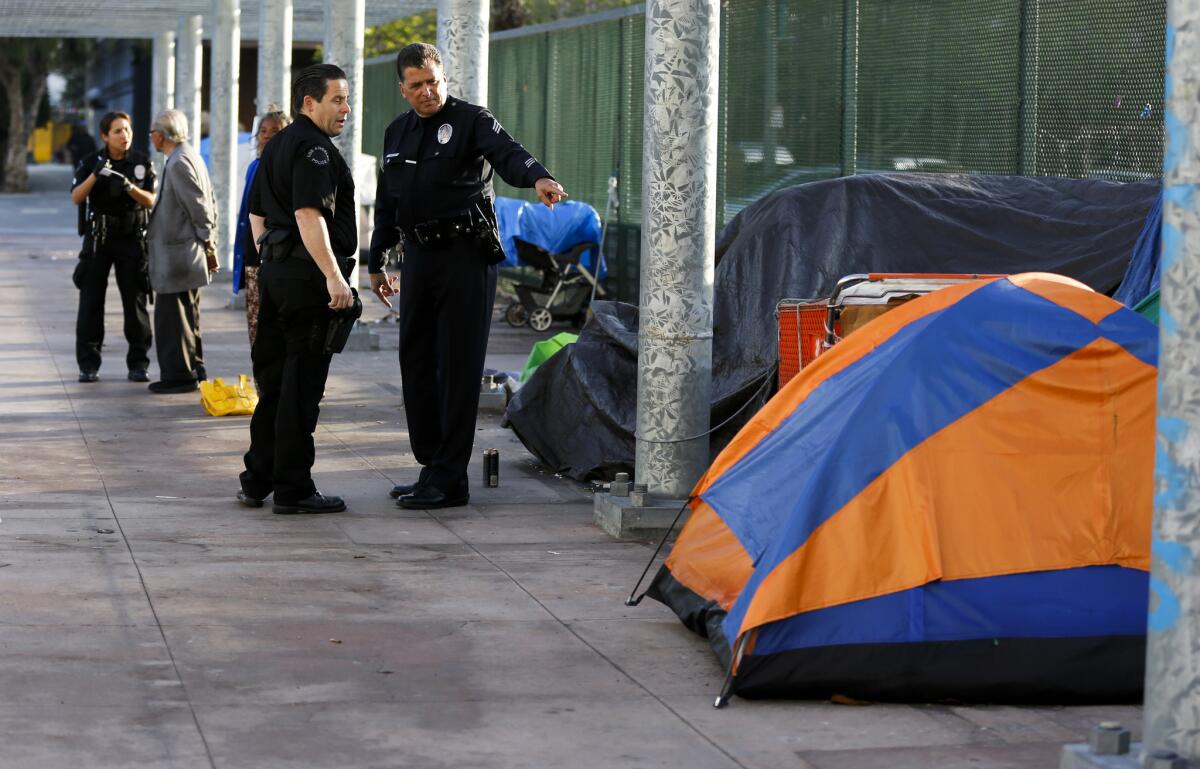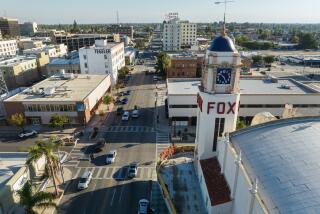L.A. County plans to open a sobering center for chronic alcoholics on skid row

L.A. County supervisors voted Tuesday to establish a “sobering center” on skid row to serve dangerously intoxicated people, including those living on the streets. Above, a homeless encampment above the 101 Freeway last week.
Los Angeles County supervisors voted Tuesday to open a “sobering center” on skid row where emergency responders will be able to take dangerously intoxicated people, including those living on the streets of downtown.
Supervisors Mark Ridley-Thomas and Hilda Solis, who proposed the measure, wrote that chronic alcoholics are often “either picked up by the police due to their erratic and sometimes threatening behavior or by ambulance as a result of a 911 call,” and are taken to jail or emergency rooms.
First responders spend hours waiting for intoxicated patients to be taken into county hospital emergency rooms, the supervisors said. In many cases, after the patient is treated and released, the cycle repeats.
“This is a scenario that plays out hundreds of times a month with no meaningful intervention for the patient and at great cost to” the Los Angeles Fire Department and county healthcare system, the supervisors wrote.
Some homeless patients with chronic alcoholism have bounced back and forth between the streets and L.A. County-USC Medical Center as many as 50 times in a year, they said.
Marc Eckstein, the Fire Department’s medical director, said it has transported some “serial inebriates” to the emergency room multiple times in a day.
“We’re spending a lot of money, tying up scarce resources, and it’s really not benefiting anybody very much,” he said. “There’s no good alternative right now, so this sobering center fills a huge void.”
Bystanders often call 911 after seeing someone who is intoxicated fall and get hurt. In extreme cases, chronic alcoholics may have seizures from alcohol withdrawal.
The most serious medical cases will still go to the emergency room, Eckstein said, but the addition of the sobering center means that responders will have somewhere else to take people who are intoxicated enough to be a potential danger to themselves but do not require emergency medical care.
Eventually, the Fire Department may even set up mobile units specifically designed to find and transport people to the center.
Once patients sober up, county officials said, they will be referred to treatment and housing programs.
Cities such as Portland, Ore., and San Antonio have centers like the one Los Angeles County plans to open, but the new skid row center will be the first of its kind in Los Angeles.
It will occupy a county-leased building on Maple Avenue that had previously housed a mental health center, and will be run by the Department of Health Services. Officials said it will be able to handle about 8,000 visits a year, with most patients staying eight to 23 hours.
Mark Ghaly, director of community programs for the health department, said the center will be staffed by a nurse practitioner and clinicians as well as substance abuse counselors and service providers and will probably be able to handle 40 to 50 patients at a time. The center should be open and running by fall, he said.
County officials said it will cost $2 million to establish the center and an additional $3.4 million a year to maintain it. In the long run, they hope it will save money by diverting people from more-expensive hospital stays.
The sobering center was proposed as part of a push to reduce homelessness in the county and to divert low-level offenders and people suffering from mental illness out of county jails.
The county has five psychiatric urgent care centers where police and first responders can bring people who are having a mental health crisis. But those centers are not set up to take people who are also extremely intoxicated and might require medical care.
Ghaly said he hopes that the urgent care and sobering centers will work together to help prevent low-level offenders with mental health and substance abuse problems from landing behind bars.
“It’s really the intersection of health and the criminal justice system,” Ghaly said.
Twitter: @sewella
ALSO
Angry man spends $200 at sushi restaurant, leaves 13-foot python instead of tip
Former L.A. City Council aide, wife acquitted of embezzlement in corruption case
FBI should know within 2 weeks if terrorist Farook’s iPhone can be unlocked without Apple’s help
More to Read
Start your day right
Sign up for Essential California for news, features and recommendations from the L.A. Times and beyond in your inbox six days a week.
You may occasionally receive promotional content from the Los Angeles Times.







